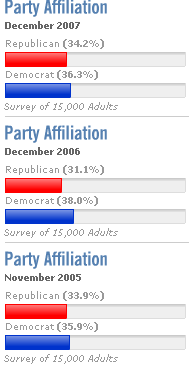Republican Support Trending Up?
 The percentage of Americans identifying as Republican has increased while support for Democrats has dropped off, Rasmussen reports.
The percentage of Americans identifying as Republican has increased while support for Democrats has dropped off, Rasmussen reports.
The number of Americans who consider themselves to be Republicans jumped nearly two percentage points in December to 34.2%. That’s the largest market share for the Republican brand in nearly two years, since January 2006 (see history from January 2004 to present).
At the same time, the number of Democrats fell to 36.3%. That’s down a point compared to a month ago. During 2007, the number of Democrats has ranged from a low of 35.9% in July to a high of 37.8% in February.
These results are based upon tracking surveys of 15,000 adults per month. The margin of sampling error is less than one percentage point, with a 95% level of confidence. Please keep in mind that figures reported in this article are for all adults, not Likely Voters.
Ed Morrissey thinks these trends reflect public dissatisfaction with the job the Democrats in Congress, particularly Speaker Pelosi, have done, along with a sense that the Democratic presidential field is not ready for prime time. Betsy Newmark credits Congressional Republicans having seen the error of their ways after their 2006 midterm defeat.
While I think these points have some merit — along with the simple fact that Democrats, with control of Congress, now have to actually participate in governing rather than simply blaming everything that goes wrong on the Republicans — – these movements are small and I would be cautious about reading too much into them. I also wouldn’t read much into the Adults/Likely Voters distinction in this particular type of survey, since it’s tracking attitude rather than attempting to predict behavior.
The real news seems to be the amazing consistency of party identification. Indeed, given that Republicans are slightly more likely to vote than Democrats, this would seem to reinforce the longer-term trend toward a “50-50” electorate.

2%? Isn’t that what Ron Paul is polling? Coincidence, I think not. They should have banned Paul supporters from participating in that poll, not because it would make it more accurate, but just because it’s fun to mess with them like that.
Take a longer term look at the presidential elections of the last 40 years.
68 – R+0.7%
72 – R+32.15%
76 – R-2.06%
80 – R+9.74%
84 – R+18.21%
88 – R+7.72%
92 – R-5.56%
96 – R-8.51%
00 – R-0.51%
04 – R+2.46%
R > 50% 5 out of 10 times.
D > 50% 1 out of 10 times
R average 50.08% (median 49.39%)
D average 44.64% (median 44.33%)
The modern electorate has favored the GOP in general. Both parties have had about the same floor (37.52% for dems in 72, 37.45% for reps in 92). The difference is that the dems have only once in the last forty years been able to break 50% (76 with 50.08%), while the peak for the reps was 69.67%.
These numbers by Rasmussen are playing around with the base. The election is decided by the other 29.5%. That is also why 2 out of 3 of the dems wins came with significant 3rd party participation and the third came from significant reps screw up (76 after Watergate).
YAJ,
Your numbers seem to make the case that the American people have preferred the Democrats in three out of the last four presidential elections.
Thanks for pointing that out!
Oh, and btw, you transposed the numbers for ’72. It was R+23, not 32.
Oh, and over those past four presidentials, the Dem candidates have recieved 48.1% of the vote, the Republicans 45.3.
Its all in the way you slice it, john.
Tano,
Your right on the ’72, my bad.
You could look at it as the public preferring democrats the 3 of the last 4 times, but that would be stretching it. In fact, 4 out of the last 4 times, a majority (aka > 50%) of the people preferred someone other than the democrats. 1 out of the last 4 times (aka the last time) a majority preferred the republican.
The Clinton in 92 was the low point for the republicans. But consider this, outside of his home state (Arkansas) and the perennial democratic bastion of DC, Clinton failed to get a majority of the votes in any state.
Bottom line is that the democrats can win if the republican vote is split (e.g. 92), but they have a hard time putting forward a position that the majority of the country can support. On the other hand, the republicans have found that > 50% point 5 of the last 10 times. You may take comfort in 3 of the last 4 as you say, but you are ignoring the fact that you haven’t put forward a majority position in any of those last 4 elections.
Thanks for the link, James. But one quibble: I didn’t credit the GOP in Congress with having seen the evils of their ways. I rather think that this is a case of disenchanted Republican voters who had splintered off in 2006 starting to return home now that they’ve seen the full glory of the Democrats in power.
Betsy